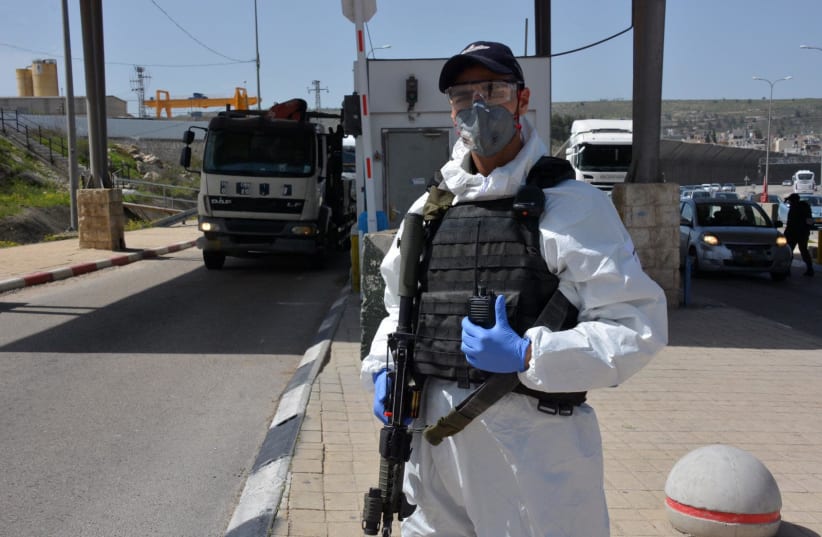The Shin Bet (Israel Security Agency) has halted all coronavirus-related surveillance of infected citizens, The Jerusalem Post has learned.
The development was foreshadowed by chaos at a cabinet meeting on this and other coronavirus-related issues on Monday.
However, the Ministerial Committee on Legislation also approved a bill on Tuesday granting the Shin Bet the authority to restart mass surveillance in the future.
In a confusing zigzag, the government's plan is not to bring this bill before the Knesset at this time, but to hold it in reserve in case the government decides during a second coronavirus wave that it wants the Shin Bet back in the game.
If that occurs, the government could push the bill through the Knesset in a matter of weeks since it is already formulated and approved by the ministerial committee.
Another key decision made by the committee was to move forward all other aspects of the emergency powers granted in the wake of the coronavirus.
Finally, the ministerial committee extended the current coronavirus emergency powers for 45 days to give more time for the Knesset process to play out.
Ultimately, it was not the High Court of Justice or civil society NGOs which ended the program, but Shin Bet Director Nadav Argaman.
Though a cabinet statement on Sunday had indicated that both Netanyahu and Alternate Prime Minister Benny Gantz supported new legislation to extend and regulate continued Shin Bet surveillance, there was pressure to bring a bill to the Knesset before prior authorization of the program by the Knesset Intelligence Subcommittee expired on Wednesday.
The Association for Civil Rights in Israel and the Israel Democracy Institute both expressed hope that the cabinet delay would finally end the controversial program.
Argaman had never desired the Shin Bet to be involved in the coronavirus crisis, but complied upon Netanyahu's request.
The agency's technology that is being used for coronavirus tracking is generally only used to track terrorists.
There were hints that if a real, major second wave hit, the government might try to bring the Shin Bet back into the picture, but it was unclear how this could be implemented if the agency is dropped from the current emergency powers bill. With the Shin Bet surveillance off the table for now, the government was able to give itself an additional 45 days to deal with other coronavirus emergency power issues.
Technically, only the Shin Bet portion of the bill needed to be rushed through in the next few weeks based on a High Court ruling on April 26.
However, Attorney-General Avichai Mandelblit, civil society groups and haredi (ultra-Orthodox) groups may maintain the pressure to push the rest of the bill through on an expedited basis.
Some of the key parameters of the non-Shin Bet aspects of the bill are still unclear and may evolve if and when it reaches the point of a Knesset debate. But overall, it normalizes many of the emergency powers the state has been using since March, while imposing a greater degree of limitations.
IN A STATEMENT issued by Justice Minister Avi Nissenkorn on Tuesday, he emphasized the bill’s aspects that will limit emergency powers and protect privacy.
The provisions he flagged included the following: The Knesset and the courts will continue to function even during a general nationwide coronavirus emergency absent some additional, specific reason; the right to protest is protected; police officers cannot enter a residence without a warrant; and initially, a coronavirus emergency is supposed to last only 30 days.
Additional limits, Nissenkorn noted, were that the Knesset itself can end the emergency despite government objections; lockdown orders for a specific city or area will be initially limited to one week; the state will take the country’s economic needs into account; and the government will repeal restrictions as soon as the danger passes.
Other provisions deal with prisoners’ rights and access to their lawyers during the crisis period. The Association for Civil Rights in Israel criticized the policy on prisoners’ rights, saying the bill still made it too easy to block the access of lawyers to the prisons. ACRI also said that based on past experience, it was concerned that the Prisons Service would ignore the new law and add new stringent restrictions on prisoners.
The cabinet and the Knesset Constitution, Law and Justice Committee moved forward with a 45-day extension for the part of the bill that allows conducting certain court hearings of defendants and prisoners via video conference.
There were also reports that Netanyahu will have to consult the broader cabinet on additional aspects of using the bill’s emergency powers – even the bill’s prior version required cabinet decisions on many issues.
It was also unclear how the government would track infection trends without the Shin Bet, though the Health Ministry's MAGEN application for voluntary downloading and the requesting of information from telecommunications companies have been discussed as alternatives during the corona period.
